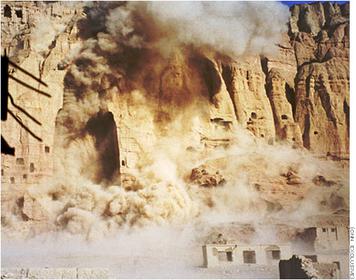
Egyptian Scientific Institute: December 17, 2011
Amid army crackdown, Egypt’s richest library set on fire
AlMasryAlYoum: A fire that engulfed the building of the historic Egyptian Scientific Institute on Saturday morning has been extinguished. The extent of the damage has not yet been determined.
The fire started on the lower floors of the building, which is on Qasr al-Aini Street in central Cairo, but later reached the higher floors. The firemen, who arrived very late at the site, could not initially control the fire.
State news agency MENA said that firemen eventually managed to control it, but state TV reported that the fire damaged the whole building and all of its collections….
The website of Youm7 newspaper alleged that a protester was set on fire after trying to set the building on fire. No other source confirmed this news.
The institute is considered the oldest scientific institute in Egypt. It was established as L'Institute d’Egypte in August 1798 by Napoleon Bonaparte during the French invasion of Egypt. Its mission is to advance high quality research in various fields, ranging from biology and mathematics to fine arts and archaeology. Its library contains more than 200,000 books, including the original volumes of the "Description de l'Égypte" (Description of Egypt), begun in 1798 by French scientists in Egypt.
Professor Mahmoud al-Shernoby, the president of the institute, told state TV in a phone interview that the damage is a “great loss” to Egypt and that those “who caused this disaster should be punished.”
read … Library Burned
Failure to protect Egyptian historic sites could trigger foreign intervention, warn experts
Al-Arabiya: Legal and archeological experts described failure to contain the fire that devoured large parts of the Scientific Complex in downtown Cairo and to rescue the priceless maps, manuscripts, and books kept inside as a disaster and warned that the possibility of similar acts of sabotage would make foreign intervention very likely.
Haggag Ibrahim, deputy chairman of the Association for the Preservation of Heritage and member of the Higher Commission for Museums, labeled those involved in setting the Scientific Complex on fire “the new Tatars” who want to erase all aspects of culture in the country.
(The new Taliban would be more accurate.)

Destruction of Bamiyan Buddhas by Taliban, Afghanistan: March, 2001
A professor of archeology, Mamdouh al-Masry, held the Supreme Council for the Armed Forces (SCAF) accountable for failing to contain the fire and arrest the culprits.
“How can the SCAF allow such farce to continue until the library is consumed by the flames? How come they did not arrest the saboteurs right away?” Masry said.
Masry stressed that the right to protest is preserved for all citizens provided that no sabotage is involved and that work progress is not interrupted. He also objected to the way the sit-in was dealt with.
“If protestors insisted on continuing their sit-in, there were several other ways to resolve the crisis other than resorting to violence.”
The fact that the fire targeted the Scientific Complex and maps of Egypt’s borders in particular raises a lot of questions about a possible conspiracy, according to Masry.
(They then proceed to blame Israel.)
Egyptian archeology professor Ayman Hassan al-Dahshan agreed that a conspiracy is involved in the library fire.
“Why did the military make sure they take photos of the fire minute by minute but did not make an effort to rescue the building and arrest the saboteurs?”
Dahshan argued that the military council is either an accomplice in the act for some unknown reason or has lost control and is unable to control acts of sabotage and to distinguish between protestors and thugs.
“In all cases, what happened to a library that houses the heritage of the most vital country in the Middle East is definitely meant to undermine the state.”
read … the rest
Egypt's Islamists claim sweep of second round vote
Egypt's two leading Islamist parties said on Sunday their separate party lists secured about three-quarters of votes cast in the second round of a parliamentary election, extending their lead in the three-stage vote.
A source from the Muslim Brotherhood's Freedom and Justice Party (FJP) said it was on track to win about 40 percent of votes for party lists, based on results from most districts.
A spokesman for the ultra-conservative Salafi al-Nour Party said its list received about 35 percent of votes.
In the first round of the six-week poll, the FJP won about 37 percent of votes for lists and Nour secured about 24 percent.
read … and the election celebration began at the library